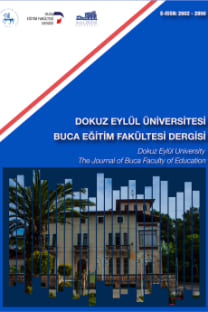ÖĞRENCİLERİN, OKUMAYA İSTEKLENDİRİCİ ETMENLERLE KARŞILAŞMA DURUMU: ÖĞRETMEN, AİLE, ARKADAŞ ve KİTAP BOYUTLARI ÜZERİNDEN BİR ARAŞTIRMA
Okuma, Okuma Güdüsü, Okul
ÖĞRENCİLERİN, OKUMAYA İSTEKLENDİRİCİ ETMENLERLE KARŞILAŞMA DURUMU: ÖĞRETMEN, AİLE, ARKADAŞ ve KİTAP BOYUTLARI ÜZERİNDEN BİR ARAŞTIRMA
Reading, Reading Motivation, School,
___
- Baker, L. (2003). The role of parents in motivating struggling readers. Reading & Writing Quarterly, 19, 87-106.
- Baker, L., ve Wigfield, A. (1999). Dimensions of children’s motivation for reading and their relations to reading activity and reading achievement. Reading Research Quarterly, 34 (4), 452- 477.
- Corcoran, C., ve Mamalikis, A. (2009). Fifth grade students’ perceptions of reading motivation techniques. Reading Improvement, 46 (3), 137-142.
- Drummond, K., V. ve Stipek, D. (2004). Low-income parents’ beliefs about their role in academic learning. The Elementary School Journal, 104 (3), 197-213.
- Gambrell, L. B. (1996). Creating classroom cultures that foster reading motivation. The Reading Teacher, 50 (1), 15-23.
- Goodin, S., M.; Weber, C., M.; Pearson, P., D. ve Raphael, T., E. (2009). Comprehension, The means, motive and opportunity for meeting the needs of diverse learners, L., M., Morrow; R. Rueda; D. Lapp (Eds.), Handbook of Research on Literacy and Diversty, New York: The Guilford Press.
- Guthrie, J. T.ve Greaney, V. (1996). Literacy acts. R. Barr, M. Kamil, P. B. Mosenthal, P. D. Pearson, (Eds.), Reading research handbook (Vol. II. pp. 68-96). Mahwah, NJ: Erlbaum.
- Guthrie, J. T., ve Wigfield, A. (2000). Engagement and motivation in reading. M. Kamil, P. B. Mosenthal, P. D. Pearson, & R. Barr (Eds.), Reading research handbook (Vol. III. pp. 403- 424). Mahwah, NJ: Erlbaum.
- Guthrie, J. T., Wigfield, A., Humenick N. M., Perencevich, K. C., Taboada, A., ve Pedro B. (2006). Influences of stimulating tasks on reading motivation and comprehension. The Journal of Educational Research, 99 (4), 232-245.
- Ivey, G.ve Broaddus, K. (2001). “Just plain reading”: A survey of what makes students want to read in middle school classrooms. Reading Research Quarterly,36(4), 350-377.
- Keleş, Ö. (2006). İlköğretim 4. ve 5. Sınıf Öğrencilerinde Kitap Okuma Alışkanlığının İncelenmesi. Yayımlanmamış Yüksek Lisans Tezi GÜ, Eğitim Bilimleri Enstitüsü. Ankara.
- Kelley, M.,J. ve Decker, E., O. (2009). The current state of motivation to read among middle school students, Reading Psychology, 30, 466–485.
- Kurulgan, M., ve Çekerol, G. S. (2008). Öğrencilerin okuma ve kütüphane kullanma alışkanlıkları üzerine bir araştırma. Anadolu Üniversitesi Sosyal Bilimler Dergisi, 8(2), 237- 258.
- Lau, K., L. (2009a) Grade differences in reading nnotivation among Hong Kong prinnary and secondary students. British Journal of Educational Psychology, 79, 713-733.
- Lau, K. T. (2009b).Reading motivation, perceptions of reading instruction and reading amount: a comparison of junior and senior secondary students in Hong Kong. Journal of Research in Reading, 32(4), 366–382.
- Law, Y-K. (2008).The relationship between extrinsic motivation, home literacy, classroom instructional practices, and reading proficiency in second-grade Chinese children. Research in Education, 80, 37-51.
- McKool, S. S. (2007). Factors that influence the decision to read: An investigation of fifth grade students’ out-of-school reading habits. Reading improvement, 22, 111-131.
- Morrow, L., M. (1992). The impact of a literature-based program on literacy achievement, use of literature, and attitutes of children from minority backgrounds. Reading Research Quarterly, 27(3), 250-275.
- Oldfather, P. (1993). What students say about motivating experiences in a whole language clasroom. The ReadingTeacher, 46 (8), 672-681.
- Schiefele, U.ve Krapp, A. (1996). Topic interest and free recall of expository test. Learning and Individual Differences, 8, 141-160.
- Schraw, G., Flowerday, T., ve Reisetter, M. F. (1998). The role of choice in reader engagement. Journal of Educational Psychology, 90 (4), 705-14
- Taboada, A.; Tonks, A., M.; Wigfield, A.ve Guthrie, J., T. (2009). Effects of motivational and cognitive variables on reading comprehension, Read Writ, 22, 85–106.
- Topçu, Y. E. (2007). İlköğretim 6, 7 ve 8. sınıf öğrencilerinin okuma alışkanlıkları. Milli Eğitim, S.176.
- Ülper, H. (2011). Öğrenci açısından okumaya güdüleyici etmenler. KUYEB, 11(2), 941-960.
- Wentzel, K., R. (2005). Peer relationship, motivation, and academic performance at school. A, J. Elliot ve C., S. Dweck (Eds.), Handbook of competence and motivation, New York: The Guilfor Press.
- Wigfield, A., ve Guthrie, J. T. (1997). Relations of children’s motivation for reading the amount and breadth of their reading. Journal of Educational Psychology, 89 (3), 420-432.
- Yılmaz, B. (2004). Öğrencilerin okuma ve kütüphane kullanma alışkanlıklarında ebeveynlerin duyarlılığı. Bilgi Dünyası, 5 (2), 115-136.
- Yayın Aralığı: Yılda 4 Sayı
- Başlangıç: 1992
- Yayıncı: Dokuz Eylül Üniversitesi
İLKÖĞRETİM I. KADEME VERİLEN PERFORMANS GÖREVLERİNİN ÖĞRETMEN GÖRÜŞLERİ AÇISINDAN DEĞERLENDİRİLMESİ
AKRAN DÖNÜT EĞĠTĠMĠ PROGRAMININ YAZMA BECERĠLERĠNĠN GELĠġĠMĠ ÜZERĠNDEKĠ ETKĠSĠ
Öğretmen görüşlerine göre çeşitli yönetim becerilerinin okul müdürleri için önem dereceleri
İdris Şahin, Kadir Beycioğlu, Necla Fırat
ÖĞRETMEN ADAYLARİNİN ÖĞRETMEN EĞİTİMİNDEKİ MODELLER HAKKİNDA GÖRÜŞLERİNİN İNCELENMESİ
İLKÖĞRETİM 6. SINIF TÜRKÇE DERSİNDE YARATICI YAZMA YAKLAŞIMININ TÜRKÇE DERSİNE YÖNELİK TUTUMA ETKİSİ
YATILI İLKÖĞRETİM BÖLGE OKULLARININ SORUNLARINA İLİŞKİN ÖĞRENCİ VE ÖĞRETMEN GÖRÜŞLERİ
FEN VE TEKNOLOJİ DERSİNE YÖNELİK BİLİMSEL SÜREÇ BECERİLERİ ÖLÇEĞİ GELİŞTİRME ÇALIŞMASI
Hilal Aktamış, Esin Şahin Pekmez
Sibel Kılınç Alpat, Melis Arzu Uyulgan, Özge Özbayrak, Şenol Alpat
